
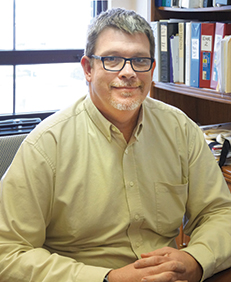
New Accounting Manager Joins Team
Travis Couch joined PLACES as senior accounting manager in October 2017. Formerly financial manager of the Housing Authority for the city of Richmond, Indiana, Travis earned his bachelor’s degree in accounting from Rasmussen College in Florida. Originally from Eaton, Travis now lives in New Madison, Ohio, in Darke County northwest of Dayton. During his career, Travis has had various accounting roles at Swihart Industries, Accountemps, New Paris Oil Company, and Economy Linen & Towel Company, Inc.
Celebrating Achievement
PLACES is proud of its clients, tenants and residents who have worked hard to achieve their goals in education, vocational training, community service and recovery. Here are some honorees who received awards at the Client Recognition event on February 16.
Adult Care Facilities
Residents of the Year
Gascho Gardens
Courtney W.
Marty’s House
William R.
Randolph House
Chris A.
Trotwood
David B.
Housing First Tenants of the Year
Belvo
Kailonia J.
Cobblegate
Andre H.
Imperial Court
Charmain L.
Tangy Court
Rhonda G.
Supportive Living Client of the Year
Dwayne B.
Dillard E.
Supportive Living Program Graduates
Teresa B.
Ron C.
Celina D.
Jenna E.
Dillard E.
Jerry T.
Rhonda W.
Artie W.
Educational Achievement Awards
Dwayne B.
John F.
Caria G.
Darrell M.
Carlton T.
Betty V.
Community Service Awards
Gascho Gardens
Chris W.
Marty’s House
Cynthia C.
Kim M.
Randolph House
Richard H.
Lisa J.
Teresa Y.
Trotwood
James G.
Imperial Court
Stephen M.
Tangy Court
Maurade B.
Rhonda G.
SLP
Elizabeth C.
Eloise H.
Theresa J.
Grace M.
Mercedes T.
Retired UD Executive Joins Board
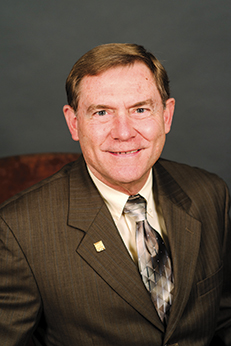
The PLACES Board of Trustees welcomed Steven D. Mueller, Ed.D., PCC, as a new member in January. For many years Mueller served as Director of UD’s Counseling Center and later took on additional responsibilities for campus recreation, alcohol and drug abuse intervention, the health center and wellness programs as Assistant V.P. of Health and Wellness.
Originally from Cincinnati, Mueller graduated from Moeller High School and earned his doctorate at the University of Cincinnati. He was honored in 2007 with the Lackner Award for his significant contribution to the Catholic and Marianist heritage at UD.
What is Supportive Housing?
Terminology in the world of social services can be confusing. For example, what’s the difference between the various types of supportive housing that PLACES offers?
We offer assistance in the form of both residential or site-based programs and community-based programs. PLACES’ Supportive Living and Opening Doors programs integrate people diagnosed with mental illness into the community at large by placing them in a variety of different living situations. PLACES staff visits them to provide case management services and life skills training. Neighbors may not have similar behavioral health issues.
In its Adult Care Facilities (ACFs) and Housing First permanent supportive housing (PSH) programs, PLACES provides longer-term housing to residents and tenants, as well as on-site supportive services. All of the people who live at these sites share common behavioral health issues.“
Regardless of the venue, PLACES strives to provide a home-like atmosphere of safety and respect for our residents, clients and tenants,” said executive director Roy Craig. “Our goal is to help the people we serve realize their individual potential and gain more independence.”
Behavioral Healthcare Redesign Is Here
After six years of study, policy making and training, the redesign of Medicaid behavioral health services in Ohio is finally here.
PLACES has been preparing many months for Behavioral Healthcare Redesign, which was implemented in January. The staff has been training on new billing procedures and documentation methods, preparing for certification to bill Medicaid in the next few months. At that time, PLACES will have an opportunity to offer more services to its residents, since some individual case management activities can be billed to Medicaid if properly documented. More change is coming later this year, as behavioral health benefits will be fully integrated into Medicaid managed care plans. The chart below provides a synopsis of the progress made so far and what is still to come.
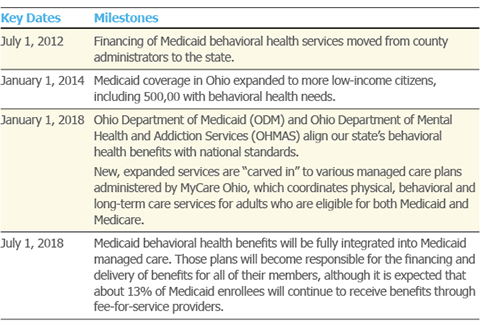
How Will the Success of Behavioral Health Redesign be Measured?
Continuity of care for consumers is a main goal of Ohio’s behavioral health redesign initiative, along with access to services, appropriate utilization, getting providers to participate, and paying them promptly and accurately. With so much change happening, how do state legislators plan to measure the success of this initiative?
» Number, type and location of behavioral healthcare providers
» Number, type and cost of behavioral health services provided to Medicaid consumers
» Number, location and array of Medicaid consumers who receive behavioral health services
It’s All in the Family
It might seem unusual for a mother and daughter to share the same employer. But it’s familiar territory for Betty and Stacey Coleman.
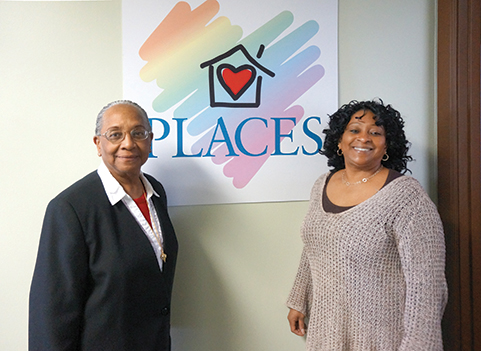
Betty and Stacey Coleman have dedicated their lives to helping others through a variety of social service roles, from court advocate and probation officer to outreach ministry. Stacey joined PLACES in 2013 as manager of Imperial Court, the newest Permanent Supportive Housing facility to be opened by PLACES to that point. A year later, her mother, Betty, joined the PLACES team as a case manager in the Supportive Living Program. Today, Stacey is manager of PLACES’ North Main adult care facility.
“When Stacey told me about PLACES, I knew it was where I wanted to work,” said Betty. “At the time it sounded like a good fit for me. Four years later, I still believe it’s a good fit. I’m proud to be part of an agency that is committed to helping and empowering people to improve their daily living.” This was the second time the pair has shared the same employer. They both worked at Eastway Behavioral Healthcare a few years before, Stacey as a community support specialist after moving back home from South Carolina in 2010 and Betty as a nurse in a teenage residential facility.
“Not a Sit-Down Agency”
Stacey relishes her role as an advocate for people who need a voice. “It’s increasingly hard to navigate resources to find services for a client,” she said. “You used to be able to make a phone call to get them help, but now it’s harder. If one agency can’t help you, you have to ask if they know anyone who does.”
Betty Coleman agrees. “PLACES is not a sit-down agency,” she explained. “We’re always striving for better ways, seeking out other resources to accomplish our mission.” Betty, who is a case manager in the Supportive Living Program, has been a nurse for more than 50 years and worked as a health nutrition specialist for Head Start.
Betty, the third of 10 children, spent her adolescent years in the Ohio Soldiers’ and Sailors’ Orphans’ Home in Xenia after her mother passed away. “It was not a David Copperfield kind of experience,” said Betty, who speaks fondly of the home as a “city within a city,” with its own trades, gardens and training classes. Betty’s father chose the home as a way to keep his large family together so they could see each other, rather than splitting them up among relatives.
Growing Demand, Increased Red Tape
Over the years, Betty has seen the need for social assistance keep growing. “In the 1980s the City of Dayton did a study on the issue of homelessness, and they didn’t find anybody on the streets. Today, the Apple Street Shelter is packed and the Men’s Gateway at Gettysburg has 200 or more,” Betty said. Stacey echoed her mother, saying that years ago “you could call up Nova House and have someone come in for an assessment right away. Now people may have to wait 30 days to get an open bed.”
Both women express dismay at the heavy toll the opioid epidemic has taken on our community. “This has hit people hard,” Stacey said. “It’s not just a matter of linking people to substance abuse services. It’s everything that pertains to human survival. Children’s Services has been faced with a lack of foster parent homes. They’re having to place children as far away as Cleveland.”
Betty talked about the increased demand for services she has seen over her decades in the profession: “Each year the population gets wider and wider. The greatest need is for people who have a heart for serving others.”
The Next Generation
One thing both ladies take pride in is seeing their children excel. “When I grew up, people could go into a factory, but times have changed,” Betty said. “I’m proud of the fact that all of my children went to college and are successful in their careers.”
Stacey shares that pride in her own children: a son who is majoring in business management and minoring in music at Kentucky State University and a daughter who is majoring in film production at Wright State and sings in an acapella group. “I always say, be sure to remember your mother when you get that Grammy!”
New Manager of Supportive Living Program
Nanci McGuire, seasoned PSH manager, promoted to lead SLP
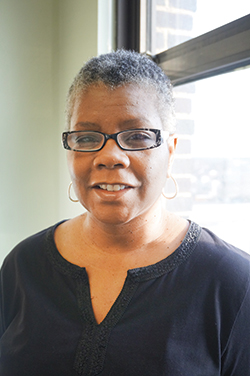
Nanci McGuire has been promoted to lead PLACES’ Supportive Living Program. Formerly the manager of two Permanent Supportive Housing sites, Nanci supervises a team of case managers who provide ongoing supportive services and life skills training to clients in the community.
SLP clients live at scattered sites owned by other agencies or private landlords. In general, they are chronically homeless and may be coming out of shelters, so need help setting up their new home.
“You’re a little anxious when you get a new place and don’t have a bed!” said Nanci. “PLACES provides start-up funds for furniture and household items. When they go shopping, clients ask for help with budgeting because it’s not a lot of money, so they want to make sure they spend it on what they really need.”SLP case managers help clients with their other needs, as well. Some lack the education needed to find employment and want to get their GED, then a job. Others may need medical attention. One client hadn’t seen a doctor in 17 years, Nanci said.
Whether dealing with site-based tenants in the PSH program or clients in the SLP, Nanci finds their struggles and needs are much the same. “In our PSH program, every day would bring something new,” she said. “A tenant may be in a bad mood and cuss you out, but later that same day they’d come to ask for help in getting a birth certificate and Social Security card for a new job. You had to be prepared for anything, especially when you see them try so hard and actually succeed. But then they might ‘celebrate’ and fall back on their addiction. It can be frustrating, so you need to be able to accept the small successes.”
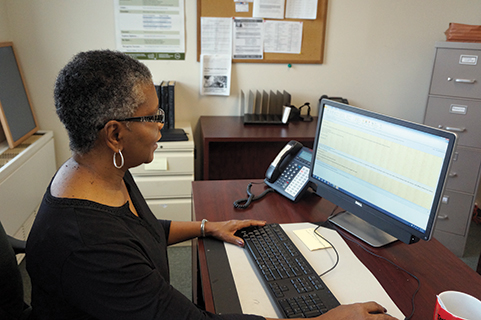
Nanci has been doing this for a long time, so she braces herself for the pushback. “I’ve developed a thick skin,” she said. “I tell them, ‘You’re not going to run me off. I’m still going to be there for you.’ The one thing clients need to know is that no matter how bad their behavior is, you’re going to be there for them. It’s kind of like being a parent. You don’t stop caring or doing what needs to be done; you still want the best for them.”


